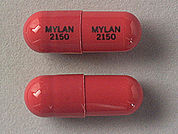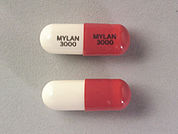Meclofenamate Sodium
Meclofenamate Sodium
What is Meclofenamate Sodium used for?
See also Warning section. Meclofenamate is used to relieve pain from various conditions (such as headache, dental pain, muscle aches, and gout attacks) and to decrease pain and blood loss from menstrual periods. It is also used to reduce fever and to relieve minor aches and pain due to the common cold or flu. Meclofenamate is also used to reduce pain, swelling, and joint stiffness from arthritis. Meclofenamate is known as a nonsteroidal anti-inflammatory drug (NSAID). It works by blocking your body's production of certain natural substances that cause inflammation. This effect helps to decrease swelling, pain, or fever. If you are treating a chronic condition such as arthritis, ask your doctor about non-drug treatments and/or using other medications to treat your pain.
CHEMICAL NAME
DRUG TYPE
Meclofenamate Sodium Prices
Searching for the lowest prices
What does Meclofenamate Sodium look like?
View all Meclofenamate Sodium Image Information (2)Meclofenamate Sodium Frequently Asked Questions
See also Warning section.
Before taking meclofenamate, tell your doctor or pharmacist if you are allergic to it; or to aspirin or other NSAIDs (such as ibuprofen, naproxen, celecoxib); or if you have any other allergies. This product may contain inactive ingredients, which can cause allergic reactions or other problems. Talk to your pharmacist for more details.
Before using this medication, tell your doctor or pharmacist your medical history, especially of: asthma, aspirin-sensitive asthma (a history of worsening breathing with runny/stuffy nose after taking aspirin or other NSAIDs), bleeding/clotting problems, blood disorders (such as anemia), growths in the nose (nasal polyps), heart disease (such as previous heart attack), high blood pressure, liver disease, stroke, swelling (edema, fluid retention), stomach/intestinal/esophagus problems (such as bleeding, heartburn, ulcers).
Kidney problems can sometimes occur with the use of NSAID medications, including meclofenamate. Problems are more likely to occur if you are dehydrated, have heart failure or kidney disease, are an older adult, or if you take certain medications (see also Drug Interactions section). Drink plenty of fluids as directed by your doctor to prevent dehydration and tell your doctor right away if you have pink/bloody urine or any unusual change in the amount of urine.
This drug may make you dizzy or drowsy. Alcohol or marijuana (cannabis) can make you more dizzy or drowsy. Do not drive, use machinery, or do anything that needs alertness until you can do it safely. Limit alcoholic beverages. Talk to your doctor if you are using marijuana (cannabis).
This medicine may cause stomach bleeding. Daily use of alcohol and tobacco, especially when combined with this medicine, may increase your risk for stomach bleeding. Limit alcohol and stop smoking. Ask your doctor or pharmacist about how much alcohol you may safely drink.
This medication may make you more sensitive to the sun. Limit your time in the sun. Avoid tanning booths and sunlamps. Use sunscreen and wear protective clothing when outdoors. Tell your doctor right away if you get sunburned or have skin blisters/redness.
Before having surgery, tell your doctor or dentist about all the products you use (including prescription drugs, nonprescription drugs, and herbal products).
Older adults may be at greater risk for stomach/intestinal bleeding, kidney problems, heart attack, and stroke while using this drug.
Before using this medication, women of childbearing age should talk with their doctor(s) about the benefits and risks. Tell your doctor if you are pregnant or if you plan to become pregnant. This medication may harm an unborn baby and cause problems with normal labor/delivery. It is not recommended for use in pregnancy from 20 weeks until delivery. If your doctor decides that you need to use this medication between 20 and 30 weeks of pregnancy, you should use the lowest effective dose for the shortest possible time. You should not use this medication after 30 weeks of pregnancy.
This medication passes into breast milk. Consult your doctor before breastfeeding.

